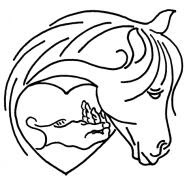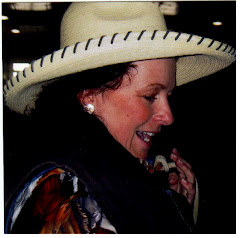Stubborn, Bored, Scared, Confused or Willing
Over the past few months I have been sharing an acronym CAWA in the feature articles of the newsletter. We have covered C-Calmness and A-Attentiveness of the horse and the human. In Dec. the article titled "The Heart Regulates the Hands" the willingness of the human was discussed. If you have missed these articles you can read them on my blog.
This month I will focus on W-Willingness again, the willingness of the horse. Of course, this is a no brainer. Who doesn't want a willing horse? I have never heard someone say, "I need to sell this horse he is just too willing, he wants to please me all the time." In fact the opposite is usually true, if you have a horse who is so willing and tolerant that he will do just about anything you ask without any resistance, this is the horse you cherish and rarely put up for sale, unless you are hopelessly desperate for cash.
Let me start by reminding you of the qualities of willingness.
The horse is:
• easy to get along with (he just seems eager to do what you ask without reluctance)
• ready to act voluntarily (there is no need to force him with external pressure, phase four is rarely necessary)
• enthusiastic to cooperate (as long as he understands he complies without hesitation)
• prompt to act or respond (he does not drag his feet, or fight against requests)
• cheerful and freely offers his obedience (his ears are forward with a soft eye, sometimes all you have to do is think or point and the horse says yes)
• agreeable or favorable disposed in his mind (he does not switch his tail, bite, kick out, or lay ears back at you)
• prepared to act on his own accord (the horse will ask questions, like “What is next?” He is seeking what the right answer is and can work things out on his own)
I doubt that there was ever a horse born who was perfect and could live up to every one of these qualities all of the time. However, there are some horses which are born more willing than others. Of course environment and learned behavior also plays a role in the temperament of a horse. It is our job to help the horse to be more willing no matter what his inborn characteristic or learned behaviors happen to be. Sometimes horses are described as stubborn or bored, scared or crazy, confused or stupid, and even downright naughty or mischievous. So how do we get a stubborn, bored, scared, confused, or naughty horse to be the willing partner we dream of?
If we want to influence and win people or horse’s hearts so they are more willing to do whatever we ask of them, then we must first find out what they need to overcome fears or weaknesses, and then discover what motivates them. If we can give them what they need and inspire them with a reward that is meaningful to them the chances of them being willing to do things for and with us will be greatly improved. We need to be the one who is flexible, change to fit their needs and provide motivation, so therein lies the first challenge. Are you willing to change to fit their needs? If you are, then the second challenge will become quite interesting. It will involve a great amount of careful observation with a little trial and error to discover what is needed, what motivates, what works and what doesn’t. But that is what makes it exciting and rewarding for you. When you finally see what is needed, what motivates, and find what works it is very satisfying.
I believe the most difficult horse for me to work with is one who is stubborn or bored rather than one who is scared and crazy. Because once you get a scared and crazy horse calmed down and trusting you it usually isn’t very hard to motivate them to be willing. However, a stubborn or bored horse which has become disrespectful can be very hard to motivate to be willing. So our approach has to be totally different with these two horses.
Let’s tackle the stubborn or bored horse first. I have discovered that they are very good at simply outlasting a person. They know you will quit long before they have to do what you want them to do. They can be very frustrating. So the first thing you must be determined to do is not give up and don’t loose your cool. To motivate them you may have to become quite provocative. Find interesting things to peak their curiosity. They need a reason to move, so I use lots of objects or obstacles, even other horses or cattle to give them a job with a purpose. Be creative, use whatever you can find. Maybe they are bored because you are boring to them. I believe mindless circles are boring too. Now I know the importance of riding good circles and I expect my horses to do that, but I change things up often to keep this horse interested in me and what we are doing. If I am bored with the circle why shouldn’t they be too? Too much repetition will bored them to death, so don’t try to perfect them in one day or you will end up with a fight on your hands. Instead, do it just long enough to make a little better change then reward them greatly. Sometimes letting them do absolutely nothing is the greatest reward in the world. So leave them alone. Treats can also be a great motivator for this horse, but I don’t make a habit of giving them out of my hand. Instead I’ll play hide and seek with them on the ground, on a barrel a post, etc.
The main thing is forward motion is critical to keep and once they offer it to you don't shut it down because if you do it will be much harder to get it next time. This horse needs to know what's in it for them. The good thing is he is clever, however sometimes smarter than we are, which is why he appears stubborn. But at least they are calm, dependable and consistent. So sometimes they will fill in for a less confident person, and then they might take over too. So bottom line is no matter what kind of horse you have you still have to learn to be a savvy horseman in order to bring out the best in him.
So now let’s talk about the horse which is the total opposite, one who is scared and crazy. This horse doesn’t need a reason to move and it is not a good idea to hold them back because it makes them want to run all the faster. Instead, let them move their feet and you will have to find some ways to interrupt their frantic patterns like lots of change of directions. Try to constructively direct their energy instead of trying to shut them down. If you are not a confident horseman then you will probably never get this horse’s trust or respect, because you must be able to always stay calm and not over react when they do.
You must introduce new things very slowly to this horse and follow it up with lots of repetition, because doing it over and over builds their confidence each time they succeed. This horse needs a lot of time in unfamiliar situations if you go to rushing this horse without using approach and retreat you will push him past thresholds and explosions will follow. Plus they will loose their trust and respect for you when you do this. So slow down, give them lots of space in tight situations and ad changes gradually. Purposeful progression is very important.
The main things is you must be a confident leader who is crystal clear. This horse is not always forgiving and will not fill in for a beginner until he is trained at higher levels, plus he must trust and respect you. However their great energy and endurance makes them very athletic. So if you want a talented performance horse they may fit the ticket, if you are patient enough to develop a relationship with them. They are highly perceptive which is good for their survival but it means they can read you like a book, so you can't fake it until you make it with them.
If you want to learn more about how to help the horse who seems confused or unpredictable, or the one who seems downright naughty or mischievous become more willing we have specific suggestions for these horses as well. You can learn about these strategies by attending one of our equine psychology workshops or a summer horsemanship camp. In the mean time remember that it is we (the humans) in this partnership who must first be willing to change to meet the needs of the horse according to his inborn characteristics and learned behaviors. Then we have to find out what motivates him. Basically all prey animals are motivated by five main desires; safety, comfort, food, play and sex. Which is much different from the primary motivators of humans which include; love, praise, recognition, and material things. As we keep these differences in mind, and keep our eyes open to subtle changes in the horse then respond appropriately we will become more effective in helping our horse to be a willing partner.
Sign up for our next equine psychology class (March 5th) or attend one of our camps this summer to learn hands on. Or get a copy of my book “Win Your Horse’s Heart” because if you can learn to win your horse’s heart you can be sure he will be a more willing horse.
Friday, February 4, 2011
Subscribe to:
Comments (Atom)












